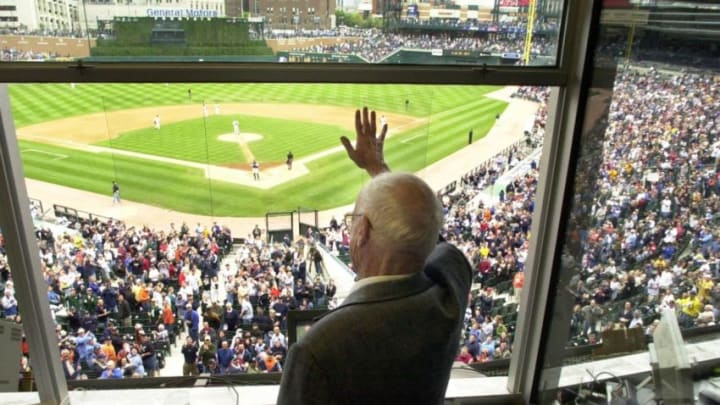Would Detroit Tigers Radio Become The Harwell App?
By Jon Erkkila

Times change. Sometimes we fear the change and sometimes it’s embraced. But, either way, change comes as technology changes everything to an app.
Fans used to wear suits and a fedora to games. There wasn’t a craft beer garden – you had “a beer”. There were actual pennant races before divisions and wildcards. World Series games were played during the day. Change occurred.
As much as any constant, we had baseball on the radio. But that armor has recently been pierced. The Oakland A’s have nixed local radio broadcasts. They’ve assessed their market and decided to stream games over an app. All games will still be available and the radio crew well known to Oakland fans will be calling the game, just digitally now.
But will it be the same? It’s a good question. One all teams will be monitoring closely because if the A’s find this to be successful it’s a safe bet other teams will follow suit.
Depending on when you came of age as a baseball fan radio likely played a major role in your fandom. The daily pace of baseball lends itself to being part of the rhythms of a summer, whether you hear the game in a store, on the car radio, at your desk, or on a camping trip with a brew and your family. If you fell asleep in bed listening to a west coast game or went out in your car to get a better reception of an AM station after dark. Baseball and radio had a very tight relationship.
Looking back at how baseball radio shaped my life is instructive. I listened to plenty of Tigers game on the shore of Lake Superior on fine summer nights. I recall still having massive U.P. snow banks left while listening to Jack Morris take on the Indians on Opening Day and dreaming of the snow being gone and local baseball to start.
The Tigers’ last World Series title in 1984 wouldn’t mean as much to me without memories of being able to hear the voices Paul Carey and Ernie Harwell waft over my hometown’s nine-hole golf course in Upper Michigan. Golf is a short season in the U.P. and most try to get in as many evening rounds as possible deep into the looming dusk. Several Tigers fans at my course had radios on their golf carts as many anticipated the club’s 35-5 start was leading to a magical conclusion and a round of golf that summer was going to include Sweet Lou, Tram, and Gibby. While we all find the Hall of Famer Harwell to be the legend to worship, it was the baritone of Paul Carey that resonated clearly around the course. The game of golf is built around solitude and quiet but nobody cared that year if Ernie and Paul were on out there. You don’t forget that. That’s baseball radio and why it’s important.
Would the Tigers be the same without a local radio broadcast? While many can easily stream a game over an app or via their MLB.com subscription with a smartphone, would Detroit (or any club) become slightly less linked to their community by not having that relationship with radio listeners and local advertisers? The A’s looming experience will be very instructive.
Certainly, there is an aging generation of fans who haven’t adapted to technology and they’ll miss terrestrial radio. But that has to be an increasingly shrinking market of fans. Baseball is going to move forward and know some stragglers will struggle. It’s the cost of adopting new tech and getting the game in front of younger eyeballs.
Change has started. Oakland likely won’t be the last. From a personal perspective, I can see the sadness involved if traditional radio went away. Truth be told, though, even though I have those fond memories of radio in my years as a fan, I cannot recall the last time I listened to the ballgame on a radio. I’m completely a streaming fan even in our car and have been for years.
Many would love to go back again and hear Carey open a broadcast with “DETROIT TIGERS BASEBALL IS ON THE AIR!” over a staticky radio reception. However, we’ve become very comfortable with Dan Dickerson coming across our phone and over our AirPods.
It’s easy to disdain change. It’s easy to say the fans are getting hosed by these decisions in some way. But change is coming. You aren’t wearing a suit to the game and many of us enjoy choosing between a Hefeweizen and a Hazy IPA versus only a regular or light. Streaming a game when a TV broadcast isn’t available is now the rule in Oakland and maybe to a city near you soon.
In the end, it’s going to be okay. Terrestrial radio will hold on for a while longer, and those priceless memories we have banked never really go away.